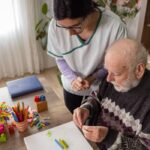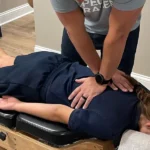Lung cancer is a cancer that initiates in the lung tissues and can potentially metastasize to other areas of the body. It is the leading cause of cancer deaths worldwide, accounting for 1.76 million deaths in 2018 alone. Dealing with a lung cancer diagnosis can be overwhelming and stressful for patients and their loved ones. That’s why having a support network of caregivers and other patients can be incredibly valuable during the lung cancer journey.
The Role of Caregivers in Lung Cancer Treatment
Caregivers play a essential role in providing physical, emotional, and practical support to lung cancer patients.They help patients manage their treatment and medication, assist with daily activities, and provide emotional support during difficult times.
However, caregiving can be physically and emotionally demanding, and caregivers may experience burnout or stress. Caregivers often need support themselves to be able to provide the best care for their loved ones. It’s crucial for caregivers to take care of their own physical and mental health to avoid caregiver fatigue.
If you’re a caregiver for a lung cancer patient, don’t hesitate to seek support from other caregivers, healthcare professionals, or patient support groups. Lung Cancer Treatment in Noida has a range of resources available for caregivers, including counseling services and support groups.
The Role of Patient Support Networks in Lung Cancer Treatment
Patient support networks, also known as peer support groups, provide emotional support and encouragement for lung cancer patients. These groups can be led by healthcare professionals, other lung cancer survivors, or online communities. Patient support networks can provide a sense of community and understanding for patients who may feel isolated or alone during their treatment.
Patients in support groups can share their experiences and learn from each other, and can offer a unique perspective on the lung cancer journey. Support groups can also provide practical advice and resources for managing treatment side effects, such as fatigue or pain.
If you’re a lung cancer patient, consider joining a patient support network in your area or online. Best Oncologist in Noida can recommend support groups or connect you with other patients in similar situations.
Lung cancer is a difficult diagnosis, but having a support network can make a big difference in the treatment process. Caregivers and patient support networks provide valuable physical, emotional, and practical support for lung cancer patients. Caregivers should take care of their own mental and physical health, and patients should consider joining a patient support network for added emotional support.
Q. How is lung cancer treated?
Lung cancer treatment may involve surgery, radiation therapy, targeted therapy, chemotherapy, immunotherapy, or a combination of these treatments.
Q. How can caregivers take care of their own mental and physical health?
Caregivers should prioritize self-care activities such as exercise, healthy eating, and getting enough rest. They can also seek support from other caregivers, healthcare professionals, or counseling services.
Q. Are patient support groups only available in-person?
No, patient support groups are available both in-person and online. Online support groups can be convenient for patients who may have difficulty attending in-person meetings.
Q. Can join a patient support group improve treatment outcomes?
While patient support groups do not directly affect treatment outcomes, they can provide emotional support and a sense of community. This support can improve a patient’s overall well-being and quality of life during the lung cancer journey.
In conclusion, caregivers and patient support networks are vital in providing support and resources during the lung cancer journey. Lung Cancer Treatment in Noida and Best Oncologist in Noida have a range of resources available to support patients and caregivers, including counseling services and support groups. By seeking support, patients and caregivers can navigate the challenges of lung cancer together and improve their overall quality of life.

 Lifestyle Changes That Could Help Lessen the Effects of Alzheimer’s
Lifestyle Changes That Could Help Lessen the Effects of Alzheimer’s  Bodyweight Basics: The Best No-Equipment Exercises for Beginners
Bodyweight Basics: The Best No-Equipment Exercises for Beginners  THC Gummies vs THC Tinctures – Which works faster?
THC Gummies vs THC Tinctures – Which works faster?  What Are the Best Treatment Options for Diabetic Retinopathy?
What Are the Best Treatment Options for Diabetic Retinopathy?  Is it Safe to Get a Massage While Pregnant?
Is it Safe to Get a Massage While Pregnant?  Maximize Your Fitness Goals: How a Personal Trainer Can Help You Achieve Lasting Results
Maximize Your Fitness Goals: How a Personal Trainer Can Help You Achieve Lasting Results  Maximize Savings and Benefits with the Right Health Insurance Services
Maximize Savings and Benefits with the Right Health Insurance Services  What is the purpose of a spinal adjustment?
What is the purpose of a spinal adjustment?  Understanding The Different Types Of Incontinence And How Home Care Can Help
Understanding The Different Types Of Incontinence And How Home Care Can Help 